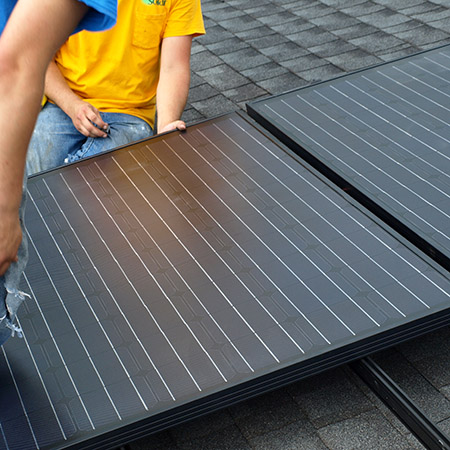What is the Lifespan of Solar Panels?
 For homeowners wanting to reduce their carbon footprint and lower electricity bills, solar panels are a wise investment. And with advancements in technology, the cost to acquire solar has been significantly reduced. This led California to become the first state in the nation to make solar panels mandatory for new home construction. But before investing in solar panels, you may want to know how long they will last before requiring replacement.
For homeowners wanting to reduce their carbon footprint and lower electricity bills, solar panels are a wise investment. And with advancements in technology, the cost to acquire solar has been significantly reduced. This led California to become the first state in the nation to make solar panels mandatory for new home construction. But before investing in solar panels, you may want to know how long they will last before requiring replacement.
The Longevity of Solar Panels
Generally speaking, most solar panels have a lifespan of 25 to 30 years. That’s about the same longevity as a high-quality roof. High-quality panels last even longer, greatly exceeding this lifespan. When a solar (PV) panel reaches their full life expectancy, they don’t completely stop functioning. They just aren’t as energy-efficient as they were when new. As long as the panels are not physically damaged, they can continue to function, but the energy output will be greatly diminished. Factors that affect the longevity of solar panels are climate and exposure to elements such as dust, dirt, and debris. The more they’re exposed to harsh environmental conditions, the faster the degradation.
Solar panels degrade over time. You can expect the annual degradation rate to be approximately 0.3% – 0.8%, per year. On average, it is around 0.5%. This means that after 25 years, the solar panels will be around 88% efficient. This is still very good because even after the solar panel’s lifespan, it’ll continue providing your home with solar energy. But keep in mind that the degradation rate is determined by the quality of the panels. Higher-quality solar panels degrade less rapidly.
How to Increase the Lifespan of Your Solar Panels
There are several ways homeowners can increase the lifespan of their solar panel investment:
Routine Maintenance
Always ensure that your solar panel is free and clear of debris, trees, and pests. Solar panels work best when exposed to direct sunlight. Therefore, routine checks are essential to ensure that there are no obstructions blocking the sun. During rainstorms and high wind conditions, dust and other particles may accumulate inside the panels. This can hinder the ability to capture the sun’s energy, resulting in reduced efficiency.
Inspection and Repairs
 Solar panels have no moving parts. Fewer parts mean less opportunity for damage. However, some solar panels may need repair or replacement due to cracks, faulty wiring and other issues that may affect the energy output of your system. An inspection by a solar provider can discover potential problems before they get worse and repair or replace any defective or damaged components.
Solar panels have no moving parts. Fewer parts mean less opportunity for damage. However, some solar panels may need repair or replacement due to cracks, faulty wiring and other issues that may affect the energy output of your system. An inspection by a solar provider can discover potential problems before they get worse and repair or replace any defective or damaged components.
If you’ve been looking for a way to reduce your energy bills, then installing a solar PV system is an excellent option. Just ensure you invest in high-quality solar panels with professional installation by a qualified solar panel provider.
